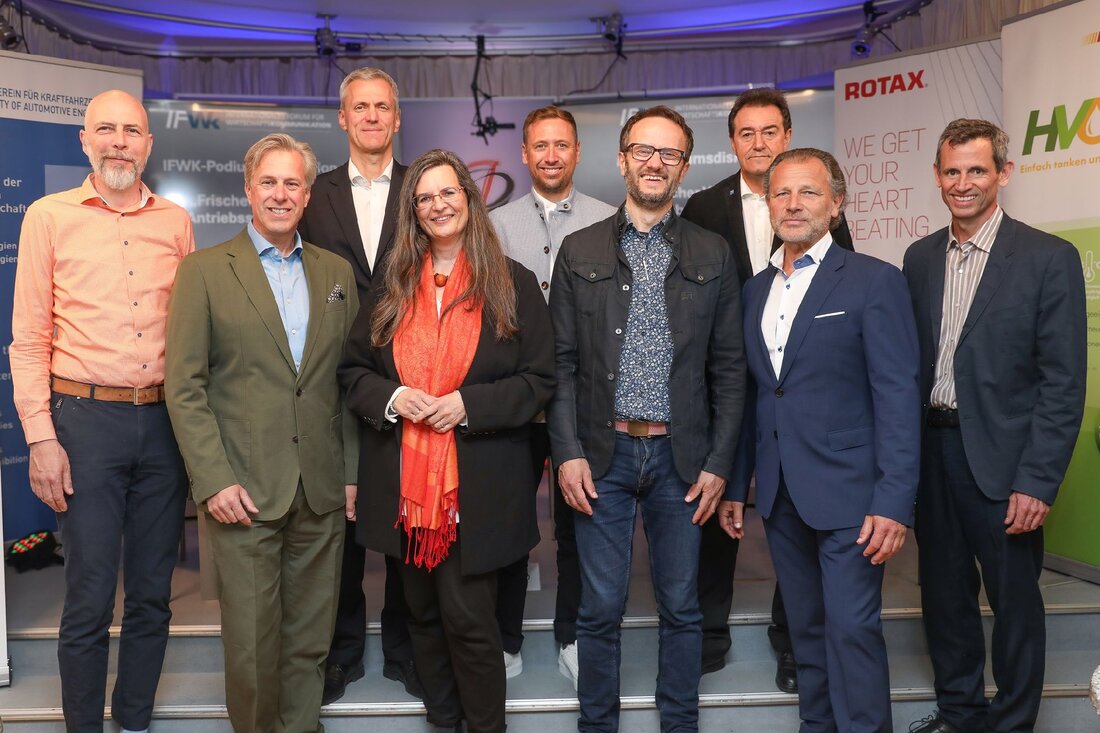Magic word defossilization”
Scientists, practitioners and media representatives discussed the relevance and practicality of carbon-neutral drive systems in the Austrian Journalists Club.

Magic word defossilization”
In the run-up to the 46th International Vienna Motor Symposium, which will take place on May 15th and 16th in the Vienna Hofburg, the founder of the International Forum for Business Communication (IFWK), Rudolf J. Melzer, invited top managers from the vehicle industry, developers, practical users, the organizer of the symposium, TU Professor Bernhard Geringer, and journalists to a discussion about drive systems with non-fossil energy sources and their Practical suitability in the Austrian Journalists Club (ÖJC). "We have to think things through from the beginning. It's about where the energy comes from, what the infrastructure has to look like and what the corresponding means of transport have to be. It has to fit together," said Markus Schermann, General Manager of BRP-Rotax Vienna GmbH, pointing out that the transformations currently underway should not be seen as a threat, but as an opportunity. The Canadian-Austrian company supplies drive systems for sports aircraft as well as for power sports equipment such as Ski-Doos, karts or quads: "We at BRP-Rotax are prepared for all scenarios; we can operate all technologies, whether alternative fuels, fuel cells or purely battery-electric. It would be important for us that reliable goals are set by the legislation as to when which technological standards must be achieved. Because only with long-term planning security can the confidence of the economy be restored."
CO2 neutral commercial vehicles
In the commercial vehicle sector, Christoph Bichler, CEO of Mopro + CO Kühllogistik, assumes that, depending on the area of application, hydrogen combustion engines will become established, but in the short term, electric drives will be the most popular. “We are currently implementing the transformation into CO2-neutral logistics solutions with the retail chains,” says Bichler. His company has been testing electrically powered commercial vehicles for food logistics for years and is pursuing the ambitious goal of converting its own fleet to electric mobility by 2030: "We have been transporting food for our partners in a CO2-neutral manner in Vienna and now throughout Austria since the beginning of 2024. Our mission will be pursued without compromise," says Bichler. For a long time now, logisticians who primarily serve the food trade have been taking advantage of the fact that carbon emissions can also be significantly reduced using fuels made from hydrogenated vegetable oils. Werner Eichinger from Energie Direct pointed out during the IFWK talk that these so-called HVO diesel fuels are a natural product made from renewable raw materials and are non-toxic (theoretically even drinkable) and definitely deserve more attention from politicians.
Planning security is required
Bernhard Geringer, who had been experimenting with biofuels as a professor at the Vienna University of Technology since the beginning of 2002, made it clear that Europe had completely underestimated the topic of lithium-ion battery technology and thus the breakthrough of electric drives and that reliable regulations were urgently needed in Europe in order to give industry and trade planning security. At this year's International Vienna Motor Symposium, not only all relevant energy sources, but all areas of mobility from cars and aviation to motorsport, commercial vehicles, shipping and two-wheelers will be examined. With the words “We may be driving slowly, but the energy is quickly gone,” the head of development at CNH Industrial, Karl Huber, hit the nail on the head when it came to the challenge in the area of agricultural and work machines. As early as the early 2000s, Europe began to replace hydrostatic drives with electric drives and is therefore now a global leader in the development of sustainably powered agricultural machinery: "One of our great strengths in Europe is diversity and inventiveness. This inspires us and leads to very efficient solutions," said the young engineer optimistically.
Diversity as a problem
Timo Völker, motor journalist at Die Presse, made international comparisons, but sees more difficulties in Europe: China and the USA are structured much more uniformly and are easier to regulate than is possible in diverse Europe: "In Europe, the spread of electromobility in new registrations ranges from one percent in Croatia to 80 or 90 percent in the Netherlands and Norway." Alexander Decker, Head of Smart Charging at Verbund Energy4Business GmbH, emphasized: "Without a mobility transition, there is no energy transition and the expansion of comprehensive charging infrastructure is crucial for the success of electromobility. We offer all-in-one charging infrastructure solutions for companies, the real estate industry, hotels, restaurants and the retail sector to make it easier to get started with electromobility." He also wants politicians to provide more planning security: "The mobility transition can only be successful if the relevant actors in politics and business pull together. Only together can we create the foundations for sustainable mobility that relies on the integration of renewable energies with intelligent energy management." At the request of Klaus Schmid, Vice President of the IFWK and moderator of the discussion, Bernhard Geringer made a final statement: “In order to get the increase in greenhouse gases caused by anthropogenic factors under control and to be able to phase out fossil fuels, not one, but all technically possible solutions are needed.”

 Suche
Suche
 Mein Konto
Mein Konto